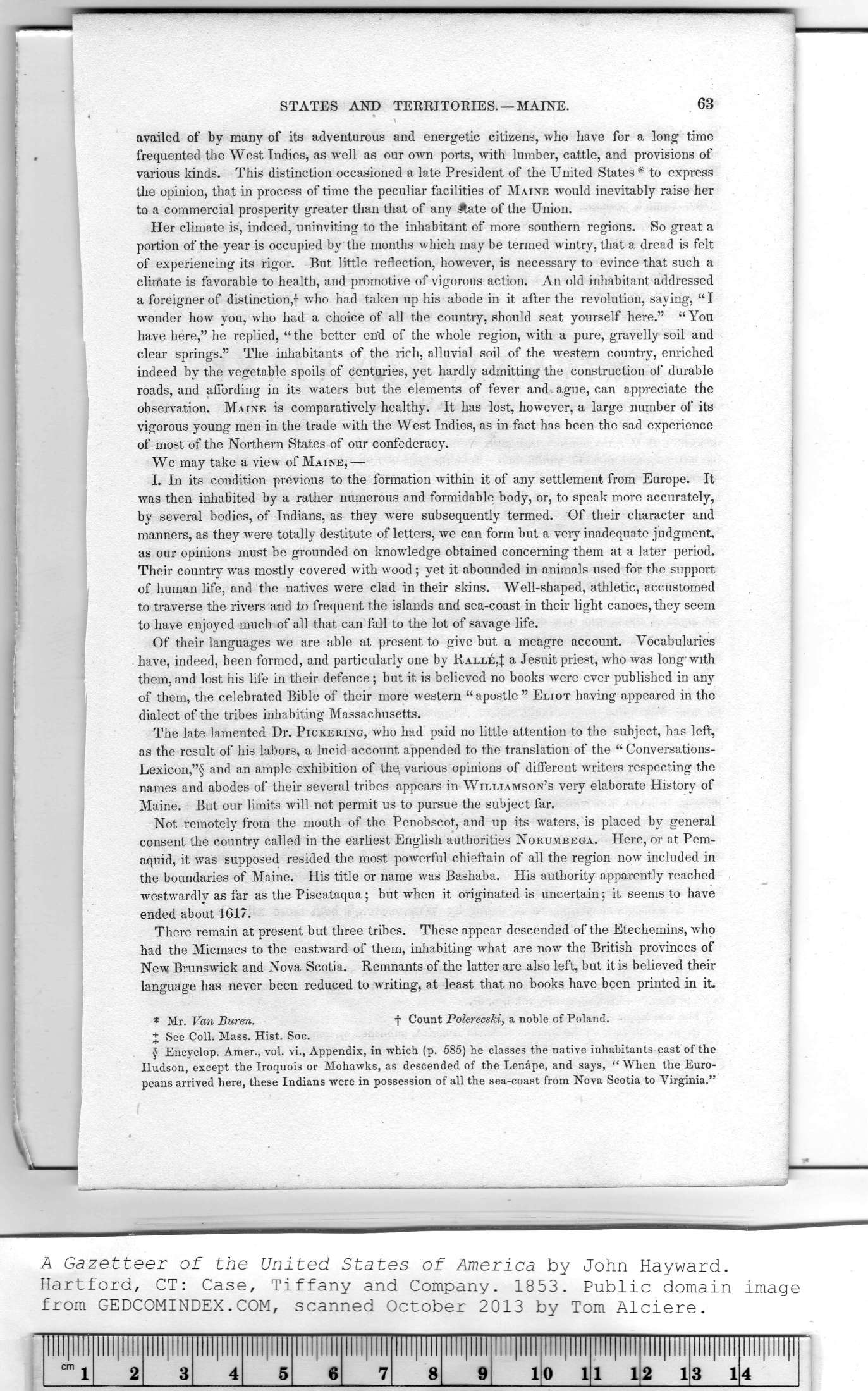|
|
Note: Ctrl and + increases the font size of the text below, Ctrl and - decreases it, and Ctrl and 0 resets it to default size.
STATES AND TERRITORIES. —MAINE. 63
availed of by many of its adventurous and energetic citizens, who have for a long time
frequented the West Indies, as well as our own ports, with lumber, cattle, and provisions of
various kinds. This distinction occasioned a late President of the United States * to express
the opinion, that in process of time the peculiar facilities of Maine would inevitably raise her
to a commercial prosperity greater than that of any Itate of the Union.
Her climate is, indeed, uninviting to the inhabitant of more southern regions. So great a
portion of the year is occupied by the months which may be termed wintry, that a dread is felt
of experiencing its rigor. But little reflection, however, is necessary to evince that such a
climate is favorable to health, and promotive of vigorous action. An old inhabitant addressed
a foreigner of distinction^ who had taken up his abode in it after the revolution, saying, “ I
wonder how you, who had a choice of all the country, should seat yourself here." “ You
have here," he replied, “ the better end of the whole region, with a pure, gravelly soil and
clear springs." The inhabitants of the rich, alluvial soil of the western country, enriched
indeed by the vegetable spoils of centuries, yet hardly admitting the construction of durable
roads, and affording in its waters but the elements of fever and ague, can appreciate the
observation. Maine is comparatively healthy. It lias lost, however, a large number of its
vigorous young men in the trade with the West Indies, as in fact has been the sad experience
of most of the Northern States of our confederacy.
We may take a view of Maine,—
I. In its condition previous to the formation within it of any settlement from Europe. It
was then inhabited by a rather numerous and formidable body, or, to speak more accurately,
by several bodies, of Indians, as they were subsequently termed. Of their character and
manners, as they were totally destitute of letters, we can form but a very inadequate judgment,
as our opinions must be grounded on knowledge obtained concerning them at a later period.
Their country was mostly covered with wood; yet it abounded in animals used for the support
of human life, and the natives were clad in their skins. Well-shaped, athletic, accustomed
to traverse the rivers and to frequent the islands and sea-coast in their light canoes, they seem
to have enjoyed much of all that can fall to the lot of savage life.
Of their languages we are able at present to give but a meagre account. Vocabularies
have, indeed, been formed, and particularly one by Ralle,| a Jesuit priest, who was long with
them, and lost his life in their defence; but it is believed no books were ever published in any
of them, the celebrated Bible of their more western “ apostle " Eliot having appeared in the
dialect of the tribes inhabiting Massachusetts.
The late lamented Dr. Pickering, who had paid no little attention to the subject, has left,
as the result of his labors, a lucid account appended to the translation of the “ Conversations-
Lexicon,"§ and an ample exhibition of the various opinions of different writers respecting the
names and abodes of their several tribes appears in Williamson's very elaborate History of
Maine. But our limits will not permit us to pursue the subject far.
Not remotely from the mouth of the Penobscot, and up its waters, is placed by general
consent the country called in the earliest English authorities Norumbega. Here, or at Pem-
aquid, it was supposed resided the most powerful chieftain of all the region now included in
the boundaries of Maine. His title or name was Bashaba. His authority apparently reached
westwardly as far as the Piscataqua; but when it originated is uncertain; it seems to have
ended about 1617.
There remain at present but three tribes. These appear descended of the Etechemins, who
had the Micmacs to the eastward of them, inhabiting what are now the British provinces of
New Brunswick and Nova Scotia. Remnants of the latter are also left, but it is believed their
language has never been reduced to writing, at least that no books have been printed in it.
* Mr. Van Buren. f Count Polerecski, a noble of Poland.
J See Coll. Mass. Hist. Soc.
§ Encyclop. Amer., vol. vi., Appendix, in which (p. 585) he classes the native inhabitants east of the
Hudson, except the Iroquois or Mohawks, as descended of the Lenape, and says, “ When the Euro-
peans arrived here, these Indians were in possession of all the sea-coast from Nova Scotia to Virginia."
|
